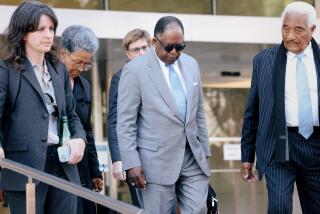Janitor Won’t Be Retried in Heist
- Share via
A 33-year-old janitor who has been serving a prison sentence of 70 years to life for allegedly committing a brutal robbery and assault in 1999 will soon go free.
Jason Kindle, whose conviction before Los Angeles Superior Court Judge Lance Ito was reversed by a state appellate panel last year, will return to court today, where the district attorney’s office will say that it will not seek to retry him.
“We’re going to announce that we have insufficient evidence to go forward on this trial,” Deputy Dist. Atty. Michael J. O’Gara said Thursday afternoon. “I will tell the court that, in the interest of justice, we move that the case be dismissed.”
Kindle’s conviction was reversed several months ago by the 2nd Appellate Court of Appeals, which said errors by Ito and Kindle’s former attorney had prevented jurors from hearing crucial evidence that probably would have persuaded them to find Kindle not guilty.
One key piece of evidence that led to Kindle’s conviction was a “things to do” list that Kindle says he compiled during a training session on working as a janitor. At trial, prosecutors depicted it as a “recipe for robbery.”
In its 2-1 ruling, the appellate panel said Ito’s court “abused its discretion” by refusing to order a retrial after learning of evidence that the items on the to-do list were janitorial tips.
The ruling -- written by Justice Earl Johnson with concurrence from the late Justice Mildred Lillie and a dissent by Justice Fred Woods -- also said Deputy Public Defender Haydeh Takasugi had erred in failing to call an expert on witnesses to challenge what the justices said were weak identifications by Office Depot employees.
The court found that Takasugi had “rendered ineffective assistance” to Kindle at trial, and reported that finding to the State Bar for possible disciplinary action. As of Thursday, no disciplinary action had been taken against her, according to State Bar records.
The ruling also raised questions about the LAPD’s conduct in interviewing store employees. It noted the department’s failure to check the alibi of another suspect closely associated with the leader of a trio who committed a series of Office Depot robberies in Los Angeles, Ventura County and Bakersfield.
Kindle also faults the LAPD, saying a detective focused unfairly on him and failed to investigate the other suspect.
“I’m convenient. I was locked up and they just stuck on me,” he said in a telephone interview from Men’s Central Jail. “The court works for those who have got everything and fails those who don’t.”
His appellate lawyer, Barry Bernstein, said: “It’s an imperfect system at best. The flaws that create the imperfections can cause some very unjust results, and Mr. Kindle’s case is an example of that.”
Deputy Dist. Atty. Debra Archuleta, the prosecutor during the trial, recently defended her description of Kindle’s notes as a recipe for robbery.
“Twelve jurors sat through a grueling trial and emotional testimony and then found Kindle guilty,” she said. “And now, two justices have overturned their verdict.”
Takasugi is on leave and did not return messages asking for comment. Ito is prohibited from discussing the case because it is back in his courtroom. An LAPD spokesman said detectives would not discuss the case because it is pending.
Kindle was convicted in October 2000 of eight counts of robbery and two counts of assault. He was sentenced to extra time because the conviction was his third strike. Jurors found him guilty of taking $15,000 in cash and $7,000 in checks at gunpoint from the Office Depot store at 2020 S. Figueroa Ave. on Nov. 22, 1999. The cash and checks were never recovered.
Witnesses said a tall, heavily disguised African American man had barged in with a handgun. He pistol-whipped the store manager, saying the manager wasn’t stuffing money into a bag fast enough. He also struck the customer service manager twice with his gun, kicked her and slammed her against a door several times. She suffered a broken ankle, two herniated disks and other injuries.
Investigators turned their attention to Kindle when an Office Depot employee reported a conversation she had with him about the robbery. She told police that Kindle, who cleaned the store twice a week, had made a vague comment about what he would have done if he had been robbing it. She also was suspicious, she said, because Kindle knew that she hadn’t been there at the time of the robbery.
On the basis of that employee’s statements, police arrested Kindle, who had a prior criminal record, in January 2000.
When Kindle went to trial two years later, the prosecution’s strongest evidence, the ruling said, was the to-do list. A detective found it on a nightstand next to Kindle’s bed, records say.
The list reminded Kindle to keep track of time and check the log books at Office Depot. It also said: “Communication with manager is very important,” “Get the [money] no free rides,” and “Keep a game plan.”
Archuleta did not submit evidence supporting her description of the list as a “recipe for robbery.” Instead, she offered that interpretation in her closing argument. Showing the list to jurors, she said: “It takes a pretty confident person to leave something like this lying around.”
Takasugi knew Kindle’s supervisor at Cover-All Cleaning janitorial service could explain the list. But she didn’t present the supervisor as a witness or provide any other evidence about it. She did offer an innocent explanation in her closing argument. She suggested that the log books were used to communicate with store personnel. Other listed items, she said, referred to keeping track of time and avoiding doing free work for clients.
Kindle did not testify. For tactical reasons, defense attorneys seldom call clients to the witness stand if the prosecution’s case is weak. They don’t want to risk subjecting the defendant to cross-examination or to give prosecutors the right to reveal a criminal record. In Kindle’s case, the record included a 1988 incident in which he assaulted a police officer and fired into an occupied vehicle.
The appeals court did not second-guess Takasugi’s decision not to have Kindle testify. But it did express concern that the supervisor had not taken the stand. The supervisor was Stephen Fisher, Kindle’s brother-in-law and owner of two Cover-All franchises. Fisher had invited Kindle to the training session at Cover-All’s main office in Orange.
Fisher testified in a post-trial hearing that he had told police and Kindle’s previous lawyers that he had seen Kindle taking notes. The witness explained that each item had been a topic at the training session. Fisher, who moved to New York about two months before Kindle’s trial, said he had never received a request from Kindle’s lawyer to testify in court.
Takasugi, also testifying in the post-trial hearing, said she had tried to call Fisher six times in New York, but that he had never returned her calls.
The appeals court found that Ito had abused his discretion by denying a retrial. It said he should have considered Fisher’s statement as newly discovered evidence because Kindle’s lawyer had been “forced” to go to trial without it.
The ruling said Fisher’s account would have provided “an innocent and plausible explanation for the ‘things to do’ ” list, and it “probably would have led to a different result on retrial.”
O’Gara, the prosecutor on the case now, said Thursday that the availability of Fisher’s statement at a new trial was one of the key reasons he felt the prosecution would not prevail again.
It was particularly important, the appellate panel said, “considering how weak the eyewitness identification testimony was.”
The court noted that, for seven weeks after the robbery, Kindle had mingled with Office Depot employees without raising any suspicions. Not until police put Kindle’s picture in a six-person photo lineup did five of the eight employees at the store during the incident say that he could have been the robber.
All but one witness acknowledged that they had not gotten a good look at the robber’s face, most of which was obscured by the disguise.
The customer service manager who was severely beaten provided the strongest identification when she looked at the photo lineup, saying she was 80% certain Kindle was the robber. At trial, she identified him as the robber.
The other four employees pointed to similarities between Kindle and the robber. But all four conceded that they couldn’t be sure.
More to Read
Sign up for Essential California
The most important California stories and recommendations in your inbox every morning.
You may occasionally receive promotional content from the Los Angeles Times.













